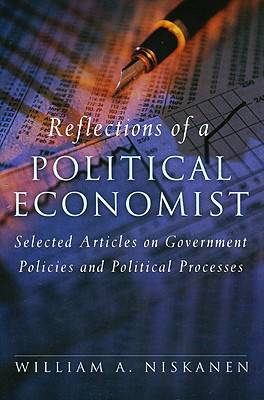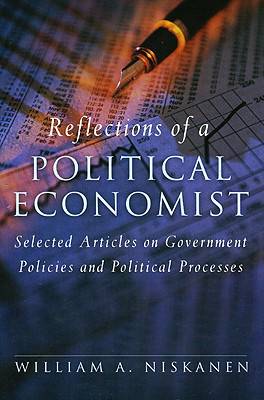
- Afhalen na 1 uur in een winkel met voorraad
- Gratis thuislevering in België vanaf € 30
- Ruim aanbod met 7 miljoen producten
- Afhalen na 1 uur in een winkel met voorraad
- Gratis thuislevering in België vanaf € 30
- Ruim aanbod met 7 miljoen producten
Zoeken
Reflections of a Political Economist
Selected Articles on Government Policies and Political Processes
William A Niskanen
Hardcover | Engels
€ 34,95
+ 69 punten
Omschrijving
Reflections of a Political Economist collects some of the most incisive and important policy analysis and public choice articles by William A. Niskanen from the last fifteen years. His interests have ranged widely during this time, covering many different areas of public policy, always with an eye toward rigorous economic thinking, fiscal conservatism, and finding shrewd, practical solutions to important problems. In Part I readers will find a discussion of a wide array of policy topics, including taxation, health and retirement funding, terrorism and military preparedness, and corporate governance. These selections bring to the discussion both hard data and theoretical sophistication, making the case for modest, sensible regulations, limited government, and free enterprise. Niskanen rarely lets easy assumptions go unchallenged; one hallmark of his work is to quantify the costs and benefits of a policy and then compare these to the conventional wisdom, which often turns up lacking. In Part II Niskanen turns to public choice, wherein he discusses economic models of various government types, voting, bureaucracy, and constitutional structure. He also reviews several of his recent research interests, including taxation and spending under autocratic, democratic, and optimal governments; European constitutionalism; and various models of bureaucracy and voting. Readers interested in public choice will find more than just summaries of settled questions, however, as Niskanen also discusses several potential research topics in a field that continues to grow. Part III includes a selection of Niskanen's book reviews, in which he considers the works of other notable economists, including Paul Krugman, Mancur Olson, James M. Buchanan, and Alan Greenspan. Part IV offers three more personal reflections, each to some degree removed from economics, but all reflecting Niskanen's thoughtful, understated approach to important issues, wherever he finds them.
Specificaties
Betrokkenen
- Auteur(s):
- Uitgeverij:
Inhoud
- Aantal bladzijden:
- 400
- Taal:
- Engels
Eigenschappen
- Productcode (EAN):
- 9781933995205
- Verschijningsdatum:
- 13/08/2008
- Uitvoering:
- Hardcover
- Formaat:
- Genaaid
- Afmetingen:
- 152 mm x 231 mm
- Gewicht:
- 839 g

Alleen bij Standaard Boekhandel
+ 69 punten op je klantenkaart van Standaard Boekhandel
Beoordelingen
We publiceren alleen reviews die voldoen aan de voorwaarden voor reviews. Bekijk onze voorwaarden voor reviews.











